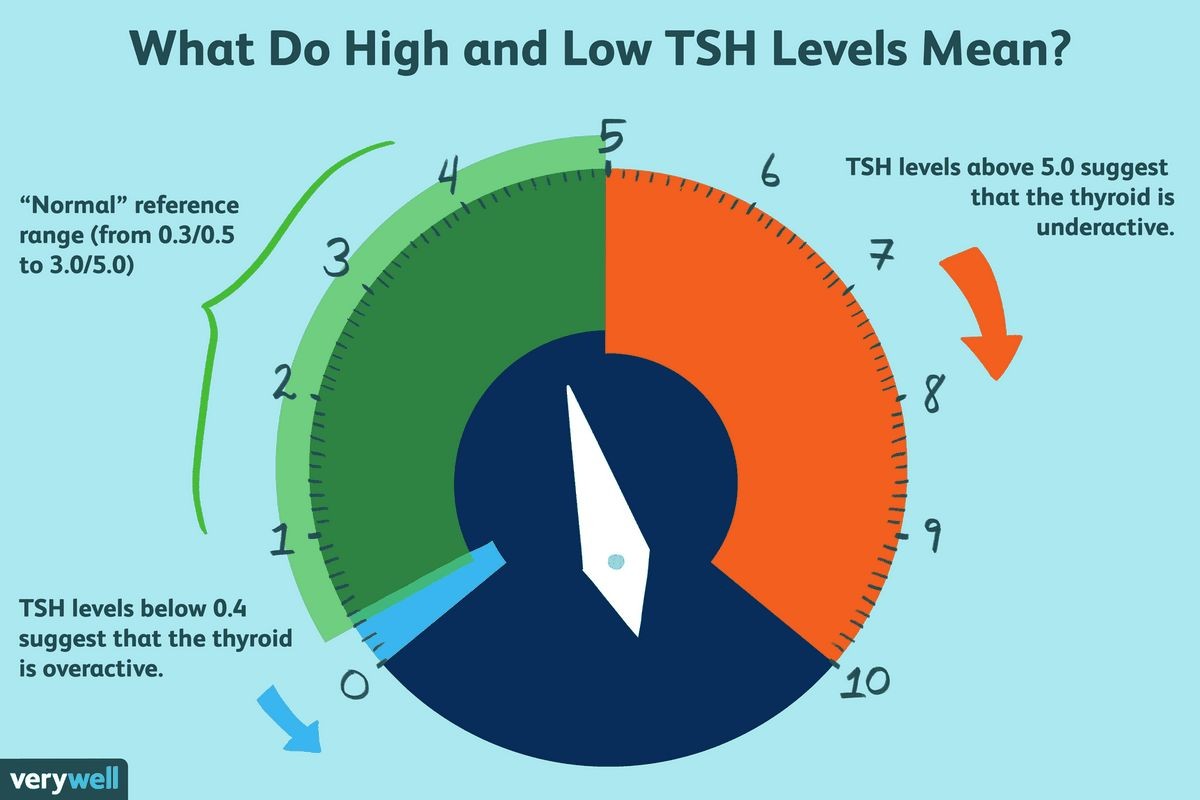
Normal, High, Low TSH Levels in a Woman
In women, TSH levels may fall slightly outside the normal range during the menstruation cycle, pregnancy, or after menopause due to fluctuating estrogen levels.
- The normal range of TSH levels in non-pregnant adult women is 0.5 to 5.0 mIU/L.
- During the first trimester of pregnancy, total T3 and T4 levels increase and TSH levels decrease. Free T4 and T3 are also high-normal in the first trimester and return to normal in the second trimester.
- Women are more likely than men to develop thyroid conditions, possibly linked to a higher incidence of autoimmune disease. Thyroid disease can affect the menstrual cycle, fertility, and pregnancy.
- Postpartum thyroiditis, an autoimmune thyroid disease occurring after delivery, affects up to 10% of women and typically resolves on its own. Autoimmune thyroid diseases tend to improve during pregnancy.
What do abnormal TSH levels mean?
Abnormal TSH levels can indicate thyroid dysfunction or pituitary gland disease. They commonly indicate the following conditions:
Low TSH, high thyroid hormone
High TSH, low thyroid hormone
What are thyroid hormones?
Thyroid hormones are secreted by the thyroid gland using iodine, a mineral present in many foods and abundant in seafood. The thyroid gland is a butterfly-shaped endocrine gland located at the base of the neck. Thyroid hormones regulate the metabolic rate and function of every organ in the body.
Thyroid hormones are found in two forms:
- Thyroxine (T4): Approximately 95% of thyroid hormone circulating in the blood.
- Triiodothyronine (T3): Formed by removing one atom of iodine from T4, accounting for the remaining 5% of thyroid hormone.
Only a small percentage of thyroid hormones are in a free form that can activate metabolism. The majority are bound to proteins in the blood, acting as a storage system.
What is thyroid stimulating hormone (TSH)?
Thyroid-stimulating hormone (TSH) stimulates the thyroid gland to produce thyroid hormones. TSH levels increase when blood levels of T4 and T3 are low, and decrease when T4 and T3 levels are high. The hypothalamus regulates pituitary gland activity.
What is a normal TSH level in adults?
Normal TSH levels may vary depending on age, sex, medical conditions, or medications. Stress and diet may also influence TSH levels.
In some situations, the endocrinologist may maintain a different range of TSH levels, such as in advanced age or thyroid disorders.
The normal ranges for TSH and thyroid hormone levels in adults are:
- TSH level: 0.5 to 5.0 mIU/L. A TSH level higher than 5.0 indicates hypothyroidism, and a TSH level lower than 0.4 indicates hyperthyroidism.
- Total T4 level: 5.0 to 12.0 mcg/dL. High T4 indicates hyperthyroidism, and low T4 indicates hypothyroidism.
- Free T4 (FT4) level: 0.7 to 1.9 ng/dL. FT4 is not affected by binding proteins and provides a more accurate measurement of thyroid function.
- Total T3 level: 80 to 220 ng/dL. Free T3 may be measured but is often less reliable.
If the above tests produce inconclusive results, additional tests may be conducted, including:
- T3 resin uptake (T3RU) test: Measures protein binding capacity of thyroid hormones.
- Free T4 index (FT4I) test: Assesses the proportion of free T4.
Other tests for detecting antibodies helpful in diagnosing autoimmune thyroid disorders include:
- Thyroid-stimulating immunoglobulin test
- Antimicrosomal antibody test
- Anti-thyroid peroxidase antibody test
- Antithyroglobulin antibody test
What are non-thyroid causes for abnormal TSH levels?
Certain medications, supplements, non-thyroid illnesses, and other factors can produce abnormal thyroid test results. It may be necessary to repeat tests and investigate other potential causes for abnormal TSH levels.
Some possible non-thyroid causes for transient changes in TSH levels include:
- Illnesses such as infection, cancer, kidney disease, or heart failure
- Medications used for heart disease or cancer
- Fasting or starvation
- Biotin supplementation
- Exposure to mice, leading to the development of antibodies
What TSH level requires treatment?
The American Thyroid Association recommends treating patients older than 65 with TSH levels below 0.1 mIU/L. Treatment may also be considered for patients younger than 65 who are post-menopausal, have coexisting conditions, or experience symptoms of hyperthyroidism.
Monitoring subclinical hyperthyroidism is an option for patients with TSH levels between 0.1 and 0.4 mIU/L and normal T3 and T4, depending on age and symptoms.
Hypothyroidism treatment is typically initiated when TSH levels persistently exceed 10.0 mIU/L, even with normal T4 and no symptoms. Subclinical hypothyroidism may require treatment based on positive thyroid antibodies, symptoms, or high risk for developing hypothyroidism.
Mild elevations in TSH levels may not require treatment and can be monitored with periodic tests. Elevated TSH levels during pregnancy may resolve on their own. Mildly elevated TSH levels in people above 80 appear to have no effect on mortality.
If you have questions about TSH levels, consult your doctor for clarification.
If you have questions about TSH levels, consult your doctor for clarification.


